 Chimps are known to ape each other, picking up traditions over time.© Getty
Chimps are known to ape each other, picking up traditions over time.© GettyThe evidence is mounting that great apes are a cultured lot, researchers heard at the annual meeting of the American Association for the Advancement of Science (AAAS) in St. Louis this week.
It is well established that apes are clever: gorillas lift electric wires with sticks to slip underneath; orang-utans can crack nuts open with rocks; and chimpanzees have been spotted elegantly sipping water from a sponge of crumpled leaves.
But these tool-using apes also show signs of cultural traditions that vary from group to group, just as some customs are passed down from one generation to another in human societies. According to a trio of researchers at the AAAS, recent work has underscored the rich cultures of our nearest relatives.
In unpublished work, Tara Stoinski of the Dian Fossey Gorilla Fund in Atlanta surveyed zoos about their gorillas and turned up more than 40 cultural behaviours, such as hand clapping as an invitation to play, that varied from group to group. This hints that traditions are passed between apes. Even separate groups within the same zoo could vary, Stoinski found.
Wild orang-utans also show cultural variation, says Carel van Schaik from the University of Switzerland in Zurich. In one case he has seen, the apes on one side of a river a different technique to remove seeds from a fruit to those across the river. "And up the river, there is no technique at all," says van Schaik, who has identified roughly 40 cultural behaviours in orang-utans.
Van Schaik says he plans to use genetic tests to determine whether orang-utans that display the same behaviour are related. He hopes that these might also show how long ago some traditions originated.
In a flap
Chimps seem to be the most cultured nonhuman primates. Andrew Whiten from the University of St Andrews in Scotland says that researchers have found a huge range of chimp behaviours in the wild, including complex foraging techniques.
Chimps even adopt what Whitten calls "fads and fashions" that only persist for a short time, such as a hand flapping behaviour that was hip in some young chimps for a while.
The researchers say their findings will be useful in elucidating the origins of human cultures. "It helps to take some of the mystery out of cultural evolution in humans," says Schaik.
ADVERTISEMENT
They add that an appreciation of culture in apes may encourage support for conservation. "The best we can do is engender respect and wonder for these animals that are so similar to us," says Schaik.
Post a comment to this story by visiting our apesfoundtoberichin.html">newsblog.
